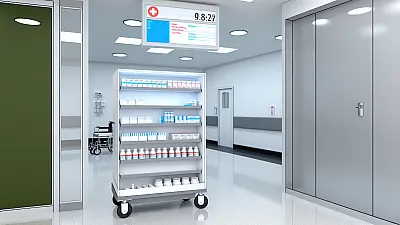LAKE GENEVA, WI - Federal inspectors found serious gaps in medical device care and infection control at Geneva Lake Manor, with one resident requiring six emergency room visits in 120 days due to complications with specialized kidney drainage tubes.

Critical Medical Device Mismanagement
The most concerning violation involved a resident with nephrostomy tubes - specialized medical devices that drain urine directly from the kidneys through the skin. The inspection revealed that facility staff lacked proper training and protocols for this complex medical equipment, resulting in repeated tube dislodgements and subsequent emergency department visits.
The resident told inspectors they had stopped wearing a prescribed abdominal binder designed to secure the tubes because "it is so tight that [they] got a rash." Staff members admitted receiving only minimal training, with one certified nursing assistant comparing nephrostomy tube care to "cleaning the penis." This comparison demonstrates a fundamental misunderstanding of the specialized care required for these critical medical devices.
Nephrostomy tubes require precise handling and secure positioning to prevent dislodgement, which can lead to serious complications including kidney infection, urinary retention, and potential kidney damage. The facility's assessment did not include staff competency evaluations for nephrostomy tube care, despite having a resident who required this specialized treatment.
Infection Control Failures Put Residents at Risk
Inspectors documented systematic failures in the facility's infection prevention program affecting residents requiring enhanced barrier precautions. Four residents with wounds were receiving inadequate protection from potential infection transmission because staff consistently failed to wear required protective equipment.
During wound care observations, nursing staff entered residents' rooms without gowns despite clear signage indicating enhanced barrier precautions were required. One registered nurse brought an entire treatment cart into isolation rooms rather than bringing only necessary supplies, potentially contaminating the cart and spreading pathogens to other residents.
Enhanced barrier precautions are critical safety measures designed to prevent the spread of multidrug-resistant organisms and protect vulnerable residents with wounds or medical devices. These protocols require staff to wear gowns and gloves during high-contact care activities including wound treatment, bathing, and device care. When properly implemented, these measures significantly reduce infection transmission rates in healthcare facilities.
Medication Management Deficiencies
The facility failed to ensure residents received prescribed medications consistently. One resident with Parkinson's disease missed three doses of Amantadine over a five-day period, with medication administration records showing the drug was "unavailable." This same resident reported to inspectors that incorrect medications or doses were administered at least three times per week, requiring constant vigilance to monitor their care.
Amantadine is essential for managing Parkinson's symptoms including tremors, stiffness, and muscle control. Missing doses can lead to symptom exacerbation and potentially dangerous complications for patients with movement disorders.
The facility also failed to follow up on pharmacy consultant recommendations for five residents. Monthly pharmacy reviews identified potential medication interactions, unnecessary prescriptions, and missing monitoring requirements, but staff did not obtain physician responses or implement recommended changes.
Nutritional Monitoring Gaps
Inspectors found inadequate nutritional monitoring for a resident who experienced a 9.2% weight loss over two months. Despite registered dietitian recommendations for daily protein supplements and weekly weight monitoring, the facility failed to implement these interventions.
The resident developed from low nutritional risk to high nutritional risk due to weight loss and pressure injuries, yet facility staff did not obtain weights for an entire month during this critical period. Significant weight loss in nursing home residents increases risks for pressure ulcers, infections, and mortality.
Staffing and Documentation Concerns
The facility failed to designate charge nurses for each shift on daily schedules, creating potential confusion during emergencies when clear leadership is essential. Additionally, required nursing staff posting information was not displayed in publicly accessible areas, preventing residents and families from understanding daily staffing levels.
Documentation issues extended to dialysis care coordination, where eight communication forms were missing from one resident's records despite facility policies requiring documentation before and after each treatment.
Additional Issues Identified
The inspection revealed problems with food safety protocols, including kitchen staff serving meals without hair restraints and failing to monitor food temperatures before service. The facility's water management program lacked detailed system diagrams and control measures required to prevent Legionella bacteria growth.
These violations collectively demonstrate systemic issues with clinical oversight, staff training, and quality assurance measures essential for resident safety and well-being.
Full Inspection Report
The details above represent a summary of key findings. View the complete inspection report for Geneva Lake Manor from 2025-03-17 including all violations, facility responses, and corrective action plans.
💬 Join the Discussion
Comments are moderated. Please keep discussions respectful and relevant to nursing home care quality.